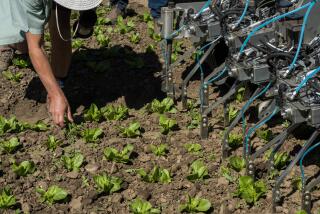Opinion: Organic farming isn’t about living in the past. It’s about creating a healthy future
- Share via
To the editor: Henry I. Miller, formerly of the FDA, is choosing to ignore the elephant in the room: the fact that many countries have now banned GMOs due to safety concerns. (Re “Fear the granola bar, not GMOs,” Opinion, June 30) He also fails to mention the many studies that link GMOs to serious digestive and reproductive diseases in livestock.
Since the introduction of GMOs into the food chain in the USA, doctors and gastroenterologists have witnessed enormous increases in human digestive disorders, and many of these same doctors urge their patients to avoid consuming any GMO food products.
Penelope Burley, Santa Rosa Valley
::
To the editor: The trouble with Miller’s argument attacking organic and non-GMO food is an equating of all organic production with the idea that all GMO products have “been exhaustively tested and are subject to government regulation” — this from the founding director the Office of Biotechnology at the FDA , now a fellow at Stanford University.
Not every organic producer pours manure on their fields, and plucking an organic tomato from your backyard is different than a GMO-produced tomato with unknown genetic properties. Don’t let the revolving government/business door hit you on the way out.
Steve Mattern, Corona
::
To the editor: I thought Miller was dead-on with the karma reference to both Clif Bars and Chipotle.
In the face of overwhelming scientific evidence, they claim to avoid GMOs for safety, and then ironically face recalls and outbreaks. Since genetically engineered crops are extensively tested, while others are not; the argument could be made that they are far safer for the consumer than any other crops.
Once again kudos to Miller for calling out the falsehoods spread by the organic marketing machine. They present their products as safer, pesticide-free alternatives, when the data shows that is not true.
Richard Green, Ventura
::
To the editor: In his highly selective examples of supposed safety violations in the organic foods industry, including cheating and a Clif Bars contamination that was caught right away, Miller fails to mention that commercial apples are sprayed with poisons several times a season as well as in storage; that pesticides and herbicides affect ground water, soil vitality, human health, and bees and other wildlife; and that the manufacturing and distribution of chemical fertilizers depends on climate-altering fossil fuels.
Jack Cooper, Studio City
::
To the editor: Organic’s so-called “19th century farming methods” are innovative and science-based, and have a clear eye on the healthy and sustainable future of our planet. The rest of agriculture is now catching up with methods of modern organic farming: crop protection with the least toxic of materials, crop production that does the least harm to the environment.
Organic farming is not about turning back the clock. It’s about moving forward to smart farming that protects our health and the health of the environment.
Laura Batcha, Washington, D.C.
The writer is the executive director of the Organic Trade Association
Follow the Opinion section on Twitter @latimesopinion and Facebook
More to Read
A cure for the common opinion
Get thought-provoking perspectives with our weekly newsletter.
You may occasionally receive promotional content from the Los Angeles Times.










